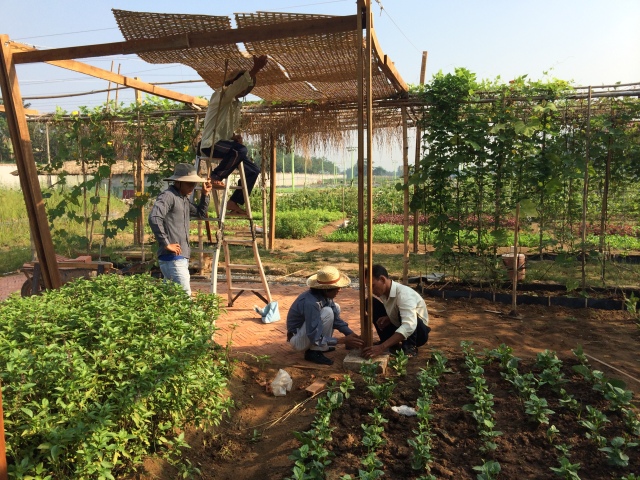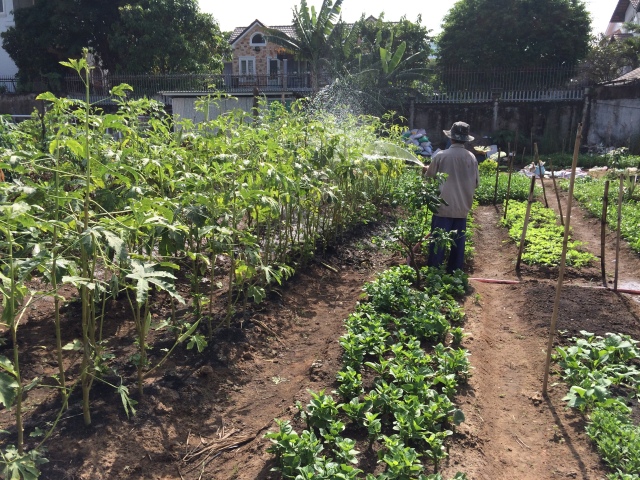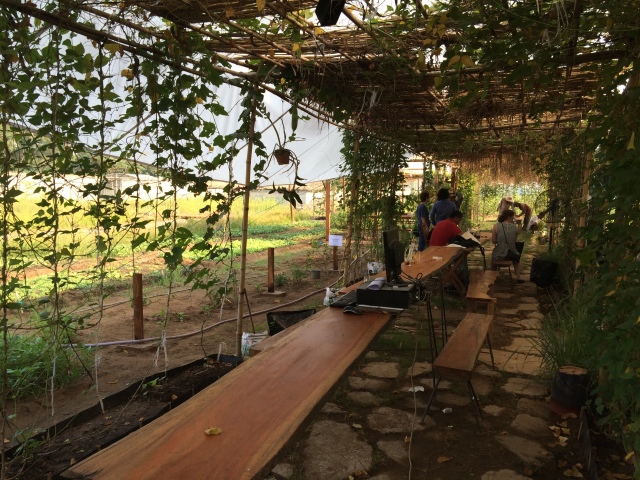Not until I moved to the South of Vietnam did I hold a strong idea of
raising community gardens in cities. But this place is definitely
different from Hanoi where I once spent 3 months to ride bicycles around
Hanoi to find land for a community garden. One doesnt have to be very
critical to realize that the chance for green jobs in Ho Chi Minh city
is boundless.
Amazingly, all of reasons for the idea of urban gardening to be
advocated and implemented are good. Starting a garden in the school,
students can joyfully escape from existing boring environment and
science lessons. Young learners even start growing curiosity and desire
to explore the beauty of interconnectedness: every ecological element,
such as soil, water, seed-plant-root, animals in the garden and so on,
is a part of bigger systems and determine the way one another works.
Children and youth grow physically and mentally from getting their hands
dirty at the practical and interactive learning environment – that can
alone solve many urban problems like internet addiction or street
violence. At the household and community levels, the idea of growing
your own food is far more than effective to protect human health,
especially when food safety and chemical food poisons are no longer big
concerns of housewives only. Imagine what can be better way to
strengthen relationships between neighborhood members who share common
spaces, planning, resources, labor works and benefits. Last but not
least, there is no doubt that urban gardens are crucial parts in
sustainable urban landscape design.

Using
different sustainable materials such as coconut and bamboo, architects
find more fun and skillful in designing green spaces for the city.
In short, this is a win-win solution: for human and for nature. My
question was that once it is this important, in what further term, urban
gardening can figure out solutions for other ecological and
environmental problems led by unsustainable practices, and at the same
time, create new hopes? Systematic collapse such as man-made climate
change threatens not only the natural ecosystem but also livelihood of
thousands of people. That is the main motivation for me to start a
vocational training programme on urban gardening in Ho Chi Minh City,
together with Green Youth Collective – a local social enterprise.
Through the process of feasibility study, nothing I could use to
illustrate personal surprise to see how many local organizations,
restaurants and cafeterias, schools had brought gardens into their
spaces. (Im growing a journal saving all stories and people I have met
working in the area!) That also means there are immense market demands
for jobs available in urban gardening. The good news is this trend is
nowhere going to stop.

Our
plot for the training is located within a system of a big community
garden, where youth easily interact with professional farmers and
families with parents and kids spending free time to grow, to harvest
and to cook right at the garden. The objective is simple: for them to
know how to work with ecological elements, but not forget the idea of a
system. This illustrates a picture of sustainability in which the output
of a certain production process can be used as the input for one
another.

The
programme offers many different faces of urban gardens: either its on a
wall, or a rooftop, or a hydroponic garden like this with recycled
plastic bottles. Half of bottles are white painted, in order to keep
nutrient water from sunlight, and to change the way it should look. Sort
of great idea, yeah? We have guest speakers who are gardeners and
business owners of places like this to come and to conduct interactive
sessions with youth. The design of vocational training programme also
serves an objective of equipping youth essential skills, knowledge and
attitudes to find their own jobs. There are many entrepreneurs who are
our partners have already offered internships and jobs for youth!

Waste
management, composting, plant container building..are also the things
we are instructing to youth. From my perspective, this is a great way to
learn how to live within the limits: when you can not exploit more, you
learn how to use available resources in different purposes. Works can
be creative and fun!
This start-up belongs to the range of what I belive and work for
sustainability literacy. Urban gardening is a beautiful and powerful
example of community empowerment, initiating sustainable practices
towards resilience to change.
For all information, please contact My Hanh, Project Manager at hanh@greenyouthcollective.org.
